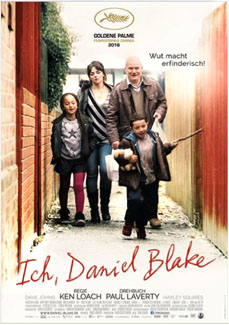
UK | France | Belgium 2016
Opening November 24, 2016
Directed by: Ken Loach
Writing credits: Paul Laverty
Principal actors: Natalie Ann Jamieson, Hayley Squires, Dave Johns, Briana Shann, Dylan McKiernan Ken Loach first came to prominence with his TV documentary Cathy Come Home in 1966 and in his latest and perhaps last movie he addresses the same problems of poverty and an inadequate welfare system.
Ken Loach first came to prominence with his TV documentary Cathy Come Home in 1966 and in his latest and perhaps last movie he addresses the same problems of poverty and an inadequate welfare system.
Daniel Blake (Johns) is a carpenter in his fifties who finds himself a victim of a complicated benefits system in present day Britain. He has had a heart attack and has been told by his doctor and his physiotherapist that he isn’t well enough to return to work. When he visits his local benefits office to seek money to cover his lack of earnings, while he is recuperating, he is given short shrift by the staff there. After a silly verbal questionnaire which claims that he is fit for work he is asked to fill in forms online (he has never used a computer and doesn’t own one), attend a course on how to write a C.V. and, most importantly, look for work.
Dan is a proud Geordie, the nickname given to people from the North East of England and Mr. Loach may have set his movie here because it has the highest rate of unemployment in the country caused by the demise of heavy industry and the lack of any replacement for it. Dan portrays the absurdities of the benefits industry with humour and defiance and Mr. Loach contrasts him with another victim of society. Katie (Squires) is late for her appointment at the same benefits office and is told to return a week later. When she protests that she is late through no fault of her own, has two children to support and only twelve pounds in her purse, Dan befriends her and he and the feisty young woman gradually come to rely on each other.
This movie is about poverty and how it is handled in present day Britain. Dan falls on hard times due to ill health; he is caught between the medical profession, which says that he isn’t well enough to work, and a bureaucracy which says that he is and won’t give him any financial help until he proves that he is actually seeking it. Katie, on the other hand, has brought hard times on herself by producing two children in her teenage years without having any support from their fathers. She grew up in London which has an acute shortage of low-income housing and after two years of living in one room with her children she is offered more spacious accommodation in the North East. She has to weigh up having more room for her children to grow up in with a complete break from everybody and everything they are familiar with. Katie is willing to work but circumstances prove too much for her.
You’ll have gathered that the theme of this movie is a sad and serious one, but that doesn’t mean that it is without humour. Dan’s conversations with the pen pushers in the benefits office may be Kafkaesque but they are very funny, too, and both he and Katie are likeable people. You may find yourself wondering why I, Daniel Blake was awarded the Palme d’Or at this year’s Cannes Film Festival. The style of the movie is that of a TV documentary and is rather ponderous. It is the movie’s theme which is memorable; you’ll find yourself thinking about it long after you leave the cinema and you’ll realise that once again Ken Loach has made a movie which highlights his burning social conscience and his concern for people on the margin of our society. ()

Director Ken Loach’s films are relevant, realistic, and champion social democracy. At the ripe young age of 80, Loach butts head with technology, the advancement of Western societies, and the System: social assistance. Obvious as well, is spotlighting inabilities and ineptitudes of humans, including that “sheep mentality.” Although set in New Castle, England, it could be any prosperous nation: Europe, USA, Australia, et al.
Welcome to the world of hardship cases. Daniel Blake (Johns) is down on his luck. Suffering a heart attack while on the job, recovering puts him at the mercy of those dishing out the “dole”, i.e. welfare. The routine is outside his domain; middle-aged, Dan is a lifelong breadwinner. Those employed by the system want all the “i’s” dotted, and “t’s” crossed. Unintentionally, Dan meets Kattie (Squires) at the local benefits office. Newly arrived in the city, and struggling to make a home for Dylan and Daisy (McKiernan, Shann), Dan’s help is unanticipated, appreciated. Afterward, an unlikely friendship develops. Two good people helping one another, Kattie’s youngsters benefit from Dan’s guidance, wisdom, and kindnesses.
Paul Laverty’s beautifully crafted screenplay combines measured humor with chilling veracity that accentuates absurdities rampant in governments—worldwide—and humanity. The humor dissipates as allegations stack up against Dan: “When you loose your self-respect, you’re done for.” Loach finesses a top-rate cast, and with a deft hand guides a small team – George Fenton, music, Robbie Ryan, cinematography, Jonathan Morris, editing, et al. Once again, Loach’s commentary temerity bashes societal preconceptions. These qualities emotive attributes ensures touching a chord in all. Because at times, “We all need the wind at our back, don’t we.” 100 minutes
